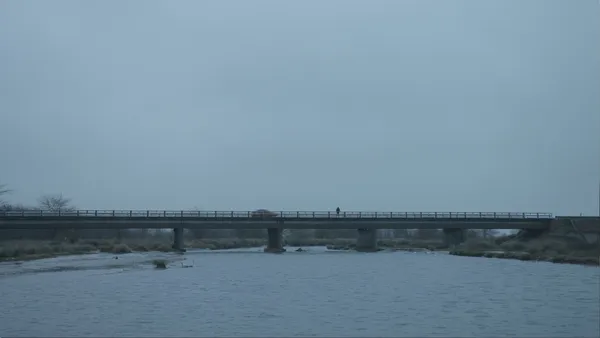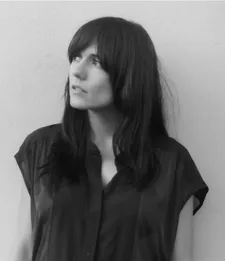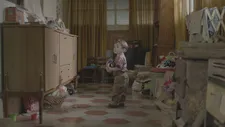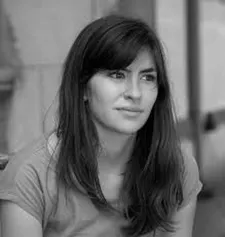 |
| Verena Kuri: 'What we wanted above all is to work with this haunting absence of this disappeared woman' Photo: Courtesy of Venice Biennale College |
Argentinian Verena Kuri and Canadian Sofía Brockenshire’s debut feature One Sister (Una Hermana) was one of four selected for this year’s Biennale College programme at Venice Film Festival, which shepherds low-budget films from development to distribution in the space of a year. The drama focuses on the impact that the disappearance of a woman has on her family and, in particular, on her sister (Sofia Palomino), who is seen battling bureaucracy and wandering the fringes of their rural town in a bid to find answers. We caught up with the fimmakers at Venice to talk about the film and its echoes in the present day through the Ni Una Menos (Not One More) protests against femicide and gender violence in Argentina.
 |
| Verena Kuri: 'We had this analogy throughout of having a baby. It was like each one taking care of the child at some point' Photo: Courtesy of Venice Biennale College |
Amber Wilkinson: In terms of the idea of a disappeared person, that is something that must have a lot of reference in Argentina still, with political echoes?
Verena Kuri: We were working with a book, it’s called Chicas Matas (Dead Girls), there are three stories in there – cases of disappeared women, all in rural, remote areas. So that was quite an inspiration for us. We tried to find images that expressed what we were reading but not as a specific interpretation of the book, just the mood and the atmosphere that we captured from the book was very helpful. And, of course, Ni Una Menos, all the demonstrations that are taking place at the moment in Argentina is a big thing. It was great for us that we had the opportunity to be in the College and talk about that. But we also saw it as a universal thing also – it’s not just happening in Argentina. What we wanted above all is to work with this haunting absence of this disappeared woman.
AW: Can you talk a bit about your use of bureaucracy in the film. It’s not a major player but you don’t have a lot of good things to say about the way the Argentinian police force is working.
VK: It appears in the movie but, as you can see, it was not so important to talk about that complicated theme. We wanted to talk about it in a different way, not in a sensationalist way. It was important to show it in the movie but we were not interested in making a film that follows the actress from the beginning to the end within the Government structure. The truth is there is really no hope. Many times when young women disappear in Argentina there is not much hope. Very often when you talk about families in these remote areas, all they can do is search for them or try to get in contact but if something like this happens, you have to find them yourselves, so this is very sad. When we investigated, we heard so many stories but in the movie we preferred to talk about the loss of these two women and to show what happens what happens to the family members rather than showing bureaucracy that doesn’t work.
AW: The film has a very distinctive melancholy mood and a very rural setting, why did you decide that?
Sofia Brockenshire: That was a conscious choice that we made. We don’t generally film in the city, we prefer going to the outskirts of small towns where there are different landscapes, and the mood is something that we were going after from the beginning. We wanted an atmosphere that was a little bit enigmatic, so people could sense things and infer things without having a lot of pivotal information.
AW: How hard was it to cast the central role – Sofia Palomino is in virtually every shot of the film?
SB: When you consider the Biennale College experience, you realise we already had very limited time to do all the steps of production. Our casting lasted two or three weeks and actually Sofia Palomini was the first person we met for any role. We were considering 10-15 girls and she improvised one of the scenes she had and was very impressive.
AW: In terms of improvisation, how much was scripted and how much did you let the actress interpret the story from within a framework?
VK: Our script changed a lot for many reasons, because we started to film in another location closer to Buenos Aires because of a lack of time. There was no real time for a lot of rehearsal either, so we met the actress four weeks before and only rehearsed with her a couple of times. It was a mixture of having things planned at the same time going to new locations and experimenting a little bit.
SB: I think it would be half and half. A lot of the interior scenes were mostly scripted and when she was out and about that’s where she got to play off a lot of emotions and impulses, so it was a good mixture.
AW: In terms of there being two of you directing – does it make it easier, do you think, especially because the constraints of the Biennale College meant it had to be quick?
_225.webp) |
| Sofia Brockenshire on Sofia Palomino: 'We were considering 10-15 girls and she improvised one of the scenes she had and was very impressive' Photo: Courtesy of Venice Biennale College |
SB: I would say yes because there really were some moments when we wanted to go off. For example, we shot at the train station and we really wanted to shoot when the train was passing by. So in some cases, one of us would talk to an actor while one is setting up the camera but we switch as well, we don’t have clearly divided roles when we’re shooting.
AW: Is it better creatively because you share the roles?
VK: Above all, to do the Biennale College project together was great. You go through many stages, of insecurity also, part of this project is that you find yourself lost at the beginning, then you find yourself and lose yourself again. It’s a lot of work. You shoot a film in a very short period of time so you never have the possibility to reflect, to lay back and really profoundly think about something. So, in this case, it’s been very helpful to have the other person to talk about it with and to brainstorm and to take it further. We had this analogy throughout of having a baby. It was like each one taking care of the child at some point.
AW: Speaking about babies how did you come up with the character of the boy in the. He has quite a crucial role, on the one hand he’s representing something that’s been lost but he is something the mother and sister have to concentrate on other than the sister.
SB: He intensifies or highlights that absence but also it’s something that Alba doesn’t know how to handle, she faces the possibility that she may have to take care of him herself, along with her mother, who also seems as though she doesn’t have the capacity to really take care of herself. I think it was a really wonderful experience with Matteo, he was one of the boys from the location that we found.
AW:In terms of the College process, how did you find that? I gather that it’s quite challenging as well as rewarding.
SB: It is incredibly rewarding. It’s a very ambitious programme and it’s an honour to be selected. But they told us at the start: “If you are selected, you can’t do anything else for a whole year.” I would say the only thing is that as a first feature film, having very limited time to stop in the editing and say, ‘We’ll have a look at this in a week and see how we feel’ – that wasn’t really possible. As soon as we finished shooting, we were straight into editing and that’s how we arrived in Venice. Non-stop.
 |
| Sofia Brockenshire: 'Matteo intensifies or highlights that absence but also it’s something that Alba doesn’t know how to handle' Photo: Courtesy of Venice Biennale College |
AW: Will you work together on other projects?
VK: Yes, we will. We have a small production company together so we work together and we’ve done some short films together before. For us it’s a little bit like we worked together with some very close friends. So it’s a nice idea for us to work as a companion for the other.
We have one other project but Sofia may be doing the production a little bit more in this particular project. We will shoot it in the jungle in Misiones in Argentina. It’s a story of a young woman who leaves who leaves her newborn child and the film is about when she comes back.
One Sister is available to view on Sala Web until September 14 for €4.






















